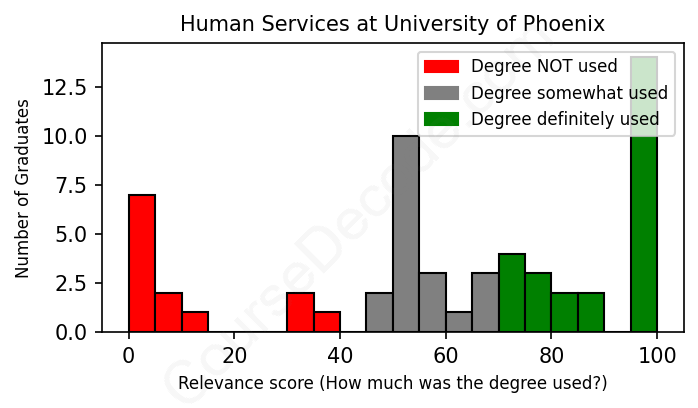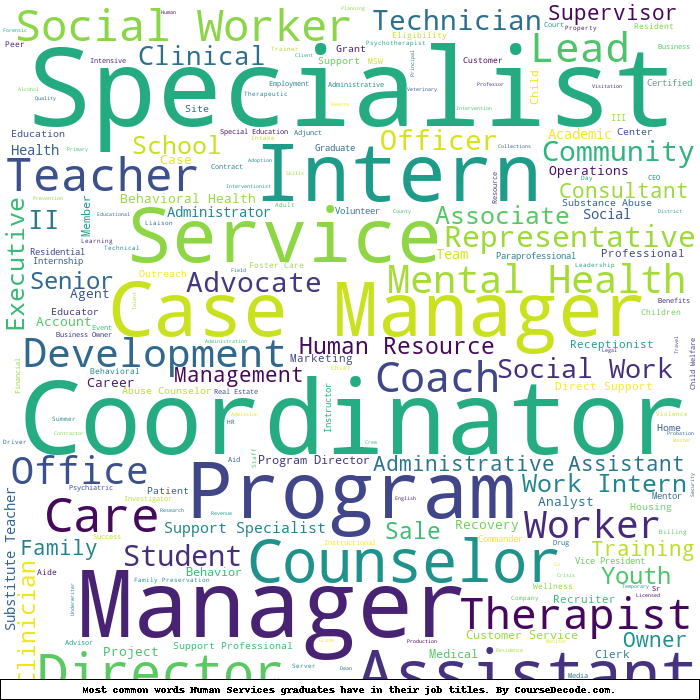
First, some facts. Of the Human Services graduates from University of Phoenix we've analyzed , here's how many have used (or NOT used) their degree in their career:

These are estimates based on AI analysis of 57 LinkedIn profiles (see below).
The verdict? Below average. Overall, with an average relevance score of 59%, Human Services graduates from University of Phoenix have a lower likelihood (-8%) of finding work in this field compared to the average graduate across all fields:
And for comparison, here's the chart for all profiles we've looked at across all degrees.
Also, after graduating, only 19% of these graduates have pursued further education other than another Bachelor's degree (such as a Masters degree or other), compared to the average across all profiles of 35%. This suggests a Bachelors degree is enough for most Human Services graduates, and it's normal to look for work straight after graduation.
See the details:
|
Relevance score: 50% We think this person has gone into a career only somewhat relevant to their degree. We think this person has gone into a career only somewhat relevant to their degree.
DEGREE INFOGraduated in 2012 from University of Phoenix with a Bachelor of Science - BS in Human Services. No other secondary education since. JOB HISTORY SINCE GRADUATIONOffice Manager Pioneer Farms Jun 2012 - Jul 2017 Office Administrator  Welding Around LLC Sep 2016 - Present ABOUTNo information provided. |
The top 10 most common jobs done by the graduates we've analyzed (ranked most common to least) are:
Analyzing the LinkedIn profiles of individuals who graduated with a degree in Human Services from the University of Phoenix, it's clear that a variety of job roles have emerged among these graduates. The most common job titles include Case Manager, Social Worker, and various roles in advocacy and community support. Many graduates have found themselves in positions that directly relate to Human Services, showcasing their ability to apply the skills and knowledge they gained during their studies in real-world settings. For example, roles like Supportive Services for Veteran Families Case Manager and Mental Health Worker are excellent fits, as they rely heavily on the principles taught in a Human Services program.
However, it's also evident that not every job held by these graduates aligns perfectly with their degree. Many have taken positions that, while they require some interpersonal skills, do not directly apply the core competencies taught in the Human Services curriculum. Roles such as Customer Service Representative or Executive Assistant fall into this category, where the connection to Human Services is either tenuous or nonexistent. Additionally, several graduates ended up in industries like finance and administration, which do not tap into their specialized knowledge about human well-being or social systems.
Overall, while many graduates from the University of Phoenix have secured jobs that are relevant to their Human Services degree, a significant number are working in roles that are less directly correlated. This suggests that while a degree in Human Services provides valuable skills for certain fields, it may not guarantee a career strictly within that scope, leading some graduates into varied career paths that utilize only a fraction of their training. The landscape is diverse, reflecting both the specialized needs for Human Services expertise and the broader employment market that sometimes skews away from direct applications of human service principles.
Here is a visual representation of the most common words in job titles for Human Services graduates (this is across all Human Services graduates we've analyzed, not just those who went to University of Phoenix):

When analyzing the career trajectories of graduates from the University of Phoenix who studied Human Services, it becomes clear that there is a mix of outcomes, with some graduates achieving significant success in their fields, while others seem to diverge considerably from their degree focus after graduation. Generally, graduates tend to secure jobs that are either directly related to human services or fall within a related support area during the initial years after earning their degree. For instance, many early roles include positions such as case managers, patient advocates, and support service specialists, which directly utilize their training in understanding and aiding individuals or communities in need.
As graduates move five to ten years into their careers, we see a more diversified picture. Some individuals remain firmly within human services, advancing to managerial or specialist roles, such as Workforce Supervisors or Training Officers, which indicates a positive trajectory where they are utilizing their expertise in significant ways. Others, however, have transitioned entirely out of human services and into unrelated fields. Positions like Office Administrator, Customer Service Specialist, or roles in different industries, such as finance or retail management, notably diverge from the realm of human services. This suggests that while some graduates find meaningful careers that align with their education, others might not experience the same level of relevance or satisfaction in their professional lives.
It's important to recognize that the success of these graduates in human services-related roles is quite notable, especially for those who continue to leverage their education effectively and seek out opportunities within that field. The progression into management or more specialized roles shows that there is potential for growth and impact within the realm of human services. However, the broader trend of some graduates shifting to fields unrelated to human services raises questions about job availability and alignment with their studied discipline. Overall, if you're considering a degree in Human Services, it's definitely worth pursuing careers that that stay connected to the empathy and service-oriented focus of the field, while being mindful that some paths may lead away from that initial calling.
Getting a Bachelor’s degree in Human Services, whether at the University of Phoenix or elsewhere, can be pretty manageable for most students, but it really depends on how you approach it. The coursework typically involves a mix of psychology, sociology, and social work principles, which can be interesting and relatable, but you’ll still need to put in some effort. If you enjoy helping people and are motivated, you’ll find it easier to stay engaged with the material. The online format at UoP can also make it more convenient since you can study on your own schedule, but that means you have to be disciplined to keep up. Overall, it’s considered to be around average in difficulty compared to other bachelor’s degrees, so if you stay organized and motivated, you should do just fine!
Most commonly, in the LinkedIn profiles we've looked at, it takes people 3 years to finish a Bachelor degree in Human Services.
Looking at the job histories of these University of Phoenix Human Services grads, it seems like they're in a mixed bag when it comes to money. For some, especially those who moved into positions like Training Officer or Social Worker, it seems they're making decent salaries, especially if they've climbed the ladder or taken roles in organizations like the Arizona Department of Economic Security. Roles like "Program Manager" and "Director of Child Care Assistance" probably come with a good paycheck too. However, positions like Case Manager or entry-level roles in customer service seem more on the low-stress, low-pay side, which is pretty common in the human services sector.
There are definitely some who have pursued higher roles with more responsibility, which generally correlates with higher pay. For example, the folks in HR or specialized roles like the Senior Quality Assurance Analyst likely did pretty well for themselves. But if you look at others who stayed in more traditional human service roles or part-time gigs, it’s likely they aren’t pulling in mega bucks. So overall, it really depends on the industry and specific job role—some are definitely living comfortably while others might be just getting by.
Here is a visual representation of the most common words seen in the "about" section of LinkedIn profiles who have a Bachelor degree in Human Services (this is across all Human Services graduates we've analyzed, not just those who went to University of Phoenix). This may or may not be useful:

Here are all colleges offering a Bachelor degree in Human Services (ordered by the average relevance score of their Human Services graduates, best to worst) where we have analyzed at least 10 of their graduates:
| College | Score | Count |
|---|---|---|
 Old Dominion University Old Dominion University
|
82 | 32 |
 Springfield College Springfield College
|
82 | 16 |
 California State University, Fullerton California State University, Fullerton
|
80 | 16 |
 Western Washington University Western Washington University
|
78 | 13 |
 Columbia College Columbia College
|
77 | 13 |
 Southern New Hampshire University Southern New Hampshire University
|
60 | 11 |
 University of Phoenix University of Phoenix
|
59 | 57 |